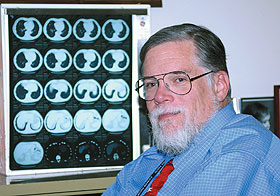  |
| HOME | THIS ISSUE | CALENDAR | GRANTS | BACK ISSUES | < BACK | NEXT > |
Health Center offers help to children with sleep disordersby Carolyn Pennington - March 2, 2009
|
||||
| Sleep deprivation is not just a problem for adults, and the Sleep Disorders Center at the UConn Health Center is treating more pediatric patients than ever before. According to a survey by the National Sleep Foundation, two-thirds of children experience frequent sleep problems. “Whether you have a newborn or a teenager, some kids just can’t sleep and others sleep too much,” says Dr. Daniel McNally, medical director of the Sleep Disorders Center. “Each phase of a child’s life can bring a new sleep pattern, but it’s important to realize that good sleep is essential to good health – no matter what the age.” Children need enough sleep to stay healthy and grow, McNally says. Sleep also promotes alertness, memory, and performance – key factors for success in school. Children who get enough sleep are more likely to function better, and are less prone to behavioral problems and moodiness. That’s why it’s important to identify sleep problems early on. The multidisciplinary Sleep Disorders Center offers state-of-the-art care to evaluate and treat sleep disorders. It is accredited by the American Academy of Sleep Medicine. Patients receive a comprehensive evaluation with diagnostic equipment in a restful atmosphere. The Center’s Dr. Jennifer Papa Kanaan, has a special interest in treating children and teens. She and McNally also work with Dr. Craig Schram, chief of pediatric pulmonary services at Connecticut Children’s Medical Center. “Children and adults behave differently as a result of sleepiness,” says Kanaan. “Adults usually become sluggish when tired, while children tend to overcompensate and speed up.” A Journal of Sleep Research study involving nearly 2,500 children aged 6-15 found that children with sleep problems were more likely to be inattentive, hyperactive, and impulsive, and to display oppositional behaviors. For this reason, sleep deprivation is sometimes confused with Attention Deficit Hyperactivity Disorder (ADHD) in children. For some ADHD children, studies have found that treating sleep problems may be enough to eliminate attention and hyperactivity problems.
Experts from the Sleep Disorders Center often counsel parents on their children’s sleep patterns, including issues such as nightmares in young children, and adolescents who sleep too much or at the wrong time. Kanaan says children also suffer from some of the same sleep disorders as adults. For instance, sleep apnea is a serious disorder in which there are pauses in breathing during sleep. Children with sleep apnea may snore loudly, experience restless sleep, and be sleepy during the day. Enlarged tonsils or adenoids, allergies, weight problems, and other medical problems may contribute to sleep apnea. Children may also be diagnosed with narcolepsy. Children with narcolepsy experience excessive daytime sleepiness and uncontrollable “sleep attacks,” even when they get enough sleep. It’s often first noticed in puberty, but may occur as early as 10 years of age. McNally says there are often simple solutions to solving a child’s sleep problems. “You need to make sure they have good sleeping habits and follow a nightly routine,” he says. “A bedtime ritual makes it easier for a child to relax, fall asleep, and sleep through the night.” He says bedtime should be a relaxing experience, without TV or videos. Studies show that watching television before going to bed can lead to difficulty falling and staying asleep. Instead, McNally says, a child’s favorite non-stimulating activity should be saved until last and take place in the child’s bedroom. If a child continues to have sleep problems and is very tired during the day, his or her physician should be consulted as to whether a comprehensive sleep evaluation is needed. |
| ADVANCE HOME UCONN HOME |

